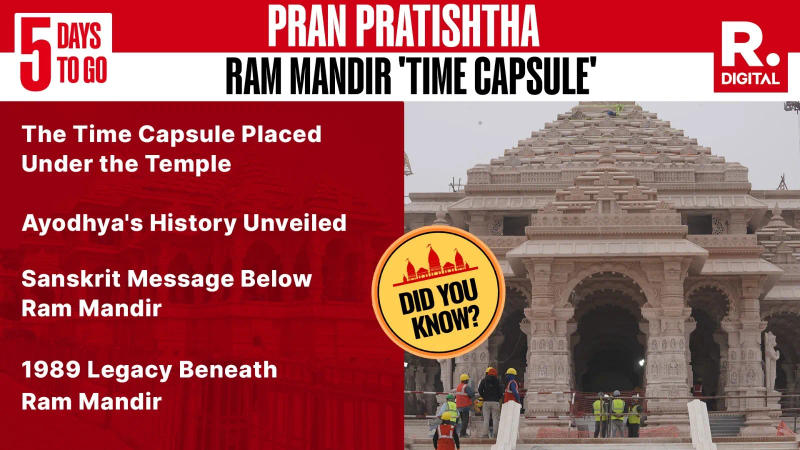Published 09:51 IST, January 17th 2024
Ram Mandir Interesting Facts: The Time Capsule Placed Under the Temple, know more
Explore Ayodhya's cultural history as the Ram Janmabhoomi Teerth Kshetra Trust places a 'Time Capsule' below the Ram Mandir.

The Ram Janmabhoomi Teerth Kshetra Trust placed a 'Time Capsule' under the 'Ram Mandir' in Ayodhya. Positioned at a depth of 2,000 feet below the construction site, this capsule will condense a detailed historical narrative of the Ram Janmabhoomi.
As expressed by Kameshwar Chaupal, a distinguished member of the trust, the capsule will be placed thousands of feet below the site to avoid any future disputes over the area. The main objective behind the time capsule's placement is to furnish accurate historical documentation of the Ram Janmabhoomi for future researchers and enthusiasts.
What message will the time capsule carry?
The time capsule will carry a message in Sanskrit, with information about Ayodhya, Lord Ram, and where he was born. Before putting it under the site, they'll wrap this message in a copper plate, called 'Tamra Patras.'
According to Chaupal, Sanskrit was chosen for its conciseness, allowing for the expression of extensive information in a few words. This classical language serves as an efficient means of communication. The use of a copper plate, 'Tamra Patras,' is intentional, ensuring the enduring preservation of the message.
In 1989, when Ram Mandir's foundation stone was laid, they also buried a copper inscription under the site. During that time, it was revealed that in 1989, when the foundation stone was laid for the Ram Mandir, they placed a copper inscription beneath the ground. Trilokinath Pandey, the lawyer representing Ram Lalla in the case, shared that at that time, the copper inscription was prepared under the guidance of Ashok Singhal, the Secretary-General of the Vishwa Hindu Parishad. Pandey explained that copper is used for such inscriptions because it doesn't corrode, and this writing will remain preserved in the soil for thousands of years.
Updated 10:02 IST, January 17th 2024




